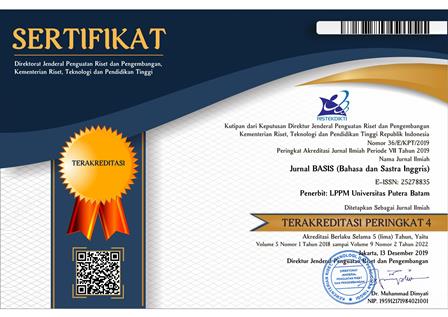SOCIAL IDENTITY AND ITS IMPACTS ON YOZO OBA’S ALIENATION IN “NO LONGER HUMAN”
DOI:
https://doi.org/10.33884/basisupb.v11i2.9266Kata Kunci:
No Longer Human, Yozo Oba, identitas sosial, alienasiAbstrak
Identitas sosial menciptakan persepsi mengenai identitas seseorang dan rasa keberadaan mereka di suatu grup sosial yang menjadi asal identitas sosial mereka. Seseorang berkemungkinan merasakan alienasi jika mereka merasa bukan bagian dari grup manapun di sekitar mereka. Dikarenakan sastra merupakan cerminan dunia nyata, Yozo Oba di No Longer Human dapat menunjukkan perkembangan identitas sosial dan dampaknya terhadap alienasi yang dialaminya. Studi ini menggunakan Social Identity Theory oleh Trepte & Loy (2017) dan teori alienasi oleh Fromm (Nadhiroh, 2015) sebagai kerangka teori. Riset ini menggunakan metode kualitatif. Penelitian perpustakaan dan metode membaca cermat digunakan untuk mengumpulkan dan menganalisis data. Dengan menganalisis Yozo Oba menggunakan prinsip Social Categorization, Social Identity, dan Self-Esteem dari Social Identity Theory, dan menggunakan konsep alienasi dari diri sendiri, alienasi dari orang lain, dan alienasi dari masyarakat, studi ini menemukan bahwa Yozo mengalami kesulitan dalam mengembangkan identitas sosialnya, sehingga mempengaruhi pengalaman dan perilakunya, serta membuatnya merasakan alienasi dari dirinya sendiri, orang lain, dan masyarakat.
Referensi
Johan, W. P., Herdiansyah, H., & Dimyati, D. (2022). The Correlation Between Inferiority Complex and Social Interactions In Adolescents. Makna: Jurnal Kajian Komunikasi, Bahasa, Dan Budaya, 11(2), 42–56. https://jurnal.unismabekasi.ac.id/index.php/makna/article/view/4435
Kalin, M., & Sambanis, N. (2018). How to Think About Social Identity. Annual Review of Political Science, 21(1), 239–257. https://www.annualreviews.org/content/journals/10.1146/annurev-polisci-042016-024408
Kantar, A., & Yalçın, İ. (2023). Masculinity and Seeking Psychological Help: A Review Based on Social Identity Theory. Psikiyatride Güncel Yaklaşımlar, 15(4), 677–686. https://dergipark.org.tr/en/pub/pgy/article/1227948
Kenklies, K. (2022). Alienation: The foundation of transformative education. Journal of Philosophy of Education, 56(4), 577–592. https://academic.oup.com/jope/article/56/4/577/7024318
Kim, H., Sefcik, J. S., & Bradway, C. (2017). Characteristics of Qualitative Descriptive Studies: A Systematic Review. Research in Nursing & Health, 40(1), 23. https://www.ncbi.nlm.nih.gov/pmc/articles/PMC5225027/
Mahbub, R. M. (2021). Alienation in the Historical Perspective: The Origin and the Cause. A Journal of Literature Arts and Culture, 6, 71–86. Online-Learning-during-COVID-19-Epidemic-in-Bangladesh-Rural-Background-Undergraduate-Students-Struggle.pdf
Mawadha, P. R., & Yulianti, A. (2023). Humans as Social Beings in the Community. International Journal of Students Education, 1(1), 22–23. https://journal.berpusi.co.id/index.php/IJoSE/article/view/63
Nadhiroh, N. A. (2015). Alienasi Manusia Modern Kritik Modernitas dalam Pemikiran Erich Fromm. Refleksi Jurnal Filsafat Dan Pemikiran Islam, 15(1), 16–29. https://ejournal.uin-suka.ac.id/ushuluddin/ref/article/view/1076
Ohrvik, A. (2024). What is close reading? An exploration of a methodology. Rethinking History, 1–23. https://www.tandfonline.com/doi/full/10.1080/13642529.2024.2345001
Pradana, A. Y. (2017). Self-Identity Establishment of The Main Character In Osamu Dazai’s No Longer Human [Undergraduate Thesis, Sanata Dharma University]. https://core.ac.uk/download/pdf/153439105.pdf
Ramin, Z., & Yadollahi, N. (2014). Social Identity Theory in Toni Morrison’s Sula. International Journal of Women’s Research, 3(1), 93–104. https://ijwr.ut.ac.ir/article_54607_600dd89b58260b25f1fc8005df3a64d7.pdf
Rhodes, M., & Baron, A. (2019). The Development of Social Categorization. Annual Review of Developmental Psychology, 1(1), 359–386. https://www.annualreviews.org/content/journals/10.1146/annurev-devpsych-121318-084824
Tajfel, H., & Turner, J. C. (2004). The Social Identity Theory of Intergroup Behavior. In J. T. Jost & J. Sidanus (Eds.), Political Psychology: Key Readings in Social Pyschology (1st ed., pp. 367–390). Psychology Press. https://www.pdfdrive.com/political-psychology-key-readings-key-readings-in-social-psychology-e184494801.html
Trepte, S., & Loy, L. S. (2017). Social Identity Theory and Self‐Categorization Theory. The International Encyclopedia of Media Effects, 1–13. https://www.researchgate.net/publication/314531246_Social_Identity_Theory_and_Self-Categorization_Theory
Wardani, D. P., Pratiwi, D. A., Basuki, I., Cahyawati, E., & Murti, G. H. (2022). Effect of Alienation in Franz Kafka’s The Metamorphosis. Scholars International Journal of Linguistics and Literature, 5(11), 387–394. https://www.researchgate.net/publication/365637516_Effect_of_Alienation_in_Franz_Kafka%27s_The_Metamorphosis
Yuwananto, N. S., Nafisah, N., & Muslim, A. B. (2022). Persona and Shadow in No Longer Human by Osamu Dazai. Passage, 10(1), 33–40. https://ejournal.upi.edu/index.php/psg/article/view/44598

















